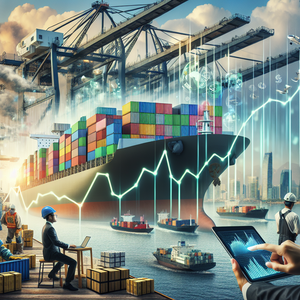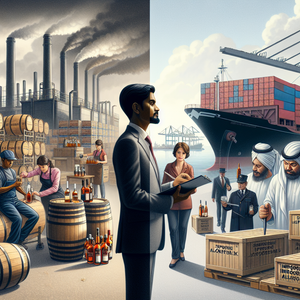
Tariffs and Their Impact on Industries, Careers, and Consumer Costs: Unlocking Opportunities in a Shifting Trade Climate
Tariffs, commonly described as taxes on imported goods, are more than just tools of trade policy—they are powerful forces that ripple through economies, reshaping industries, jobs, and consumer costs. For consumers, tariffs often translate into higher prices and fewer choices. Businesses, on the other hand, face rising production costs, supply chain disruptions, and the need to rethink long-standing strategies. Yet, amid these challenges, opportunities abound for professionals who can navigate this evolving landscape, offering solutions that drive efficiency and innovation. The effects of tariffs are particularly pronounced in sectors like manufacturing, retail, agriculture, and eCommerce. Retailers must grapple with whether to absorb tariff-driven cost increases or pass them on to consumers, while manufacturers might shift their operations to new regions to evade added expenses. Supply chain managers are tasked with finding alternative suppliers, while trade analysts and policymakers evaluate broader economic implications. This dynamic environment has fostered a growing demand for professionals with the skills to analyze, strategize, and execute in a world where trade policies are constantly in flux. This article explores 15 career paths that have emerged in response to the economic and logistical challenges posed by tariffs. Each role is uniquely positioned to address specific aspects of the trade environment, from optimizing supply chains to developing data-driven policy recommendations. By understanding these roles, professionals can identify opportunities to thrive in this rapidly changing global economy.
Job Summaries:
International Trade Analyst:
- International Trade Analysts help organizations understand the economic consequences of tariffs by analyzing trade data, predicting outcomes, and identifying alternative strategies.
- They provide actionable insights for businesses to adapt to tariff changes.
- A solid foundation in economics, finance, or international relations, along with advanced research and data analysis skills, is crucial.
Supply Chain Manager:
- Supply Chain Managers devise innovative solutions to counter tariff disruptions in global supply chains.
- They may seek alternative suppliers or localize production to manage costs.
- Expertise in logistics, cost management, and supplier negotiations, along with certifications like CSCP, is essential.
Customs Compliance Officer:
- Customs Compliance Officers ensure businesses comply with international trade laws to avoid fines and delays.
- They guide companies through tariff exemption processes and documentation.
- A background in law, international trade, or supply chain management, paired with certifications like CCS, is vital.
Retail Pricing Analyst:
- Retail Pricing Analysts adapt pricing strategies to counter tariff-induced cost increases.
- They use data analytics tools to predict consumer demand changes due to price adjustments.
- Proficiency in tools like Tableau or Excel and a degree in economics, statistics, or business is critical.
Global Logistics Coordinator:
- Global Logistics Coordinators manage the movement of goods across borders, minimizing disruptions caused by tariffs.
- They reroute shipments and optimize logistics to reduce costs.
- A degree in logistics or supply chain management, with knowledge of customs procedures, is necessary.
Economic Policy Advisor:
- Economic Policy Advisors analyze the macroeconomic impact of tariffs and guide governments and organizations with data-driven strategies.
- They evaluate effects on job creation, consumer spending, and GDP.
- Advanced qualifications in economics or public policy are often required.
eCommerce Operations Manager:
- eCommerce Operations Managers adapt to tariff-induced changes by shifting to domestic suppliers.
- Renegotiating contracts.
- Optimizing delivery routes.
- Familiarity with platforms like Shopify or Amazon.
- Background in business or supply chain management is essential.
Import/Export Specialist:
- Import/Export Specialists ensure smooth cross-border trade by handling documentation, calculating duties, and navigating tariff regulations.
- They help businesses comply with new classifications to avoid penalties.
- A degree in international business or supply chain management and certifications like CIFFA are beneficial.
Retail Operations Consultant:
- Retail Operations Consultants optimize supply chains.
- Renegotiate contracts.
- Recommend pricing adjustments to mitigate tariff impacts.
- Advise on shifting to domestic manufacturers.
- Expertise in business administration and retail operations is critical.
Manufacturing Cost Analyst:
- Manufacturing Cost Analysts evaluate how tariffs influence production expenses.
- Recommend cost-saving measures like alternative materials or suppliers.
- A background in engineering, finance, or supply chain management is essential.
- Proficiency in cost analysis tools is essential.
Agricultural Economist:
- Agricultural Economists assess the impact of tariffs on food production, pricing, and trade.
- They analyze increased costs and propose mitigation strategies.
- Strong research and data analysis skills, paired with a degree in agricultural economics, are necessary.
Trade Policy Analyst:
- Trade Policy Analysts evaluate the implications of tariffs on industries and government policies.
- They forecast impacts and provide data-driven insights.
- A master’s degree in economics or international relations and advanced data modeling skills are often required.
Retail Merchandiser:
- Retail Merchandisers adjust product assortments and sourcing strategies to accommodate tariff-driven cost changes.
- They negotiate with suppliers or switch to tariff-free products.
- Strong negotiation and analytical skills, paired with a degree in marketing or business, are essential.
Financial Risk Analyst:
- Financial Risk Analysts assess the impact of tariffs on corporate earnings, trade credit, and market stability.
- They recommend strategies to mitigate risks.
- A degree in finance or economics, along with certifications like CFA, is often required.
Tariff Litigation Attorney:
- Tariff Litigation Attorneys represent businesses in legal disputes related to trade policy and tariff compliance.
- They challenge unfair classifications or secure refunds for overpaid duties.
- A law degree specializing in international trade law is essential.
Tariffs, while often viewed as barriers, are catalysts for innovation and adaptation across industries. They present challenges, but they also create new opportunities for professionals equipped to navigate an increasingly complex trade environment. Whether your interests lie in logistics, economics, or policy, these career paths offer a chance to make a tangible impact in shaping the global economy. By acquiring the right skills, certifications, and insights, you can position yourself as a vital contributor to this ever-evolving landscape.
Explore More Jobs

